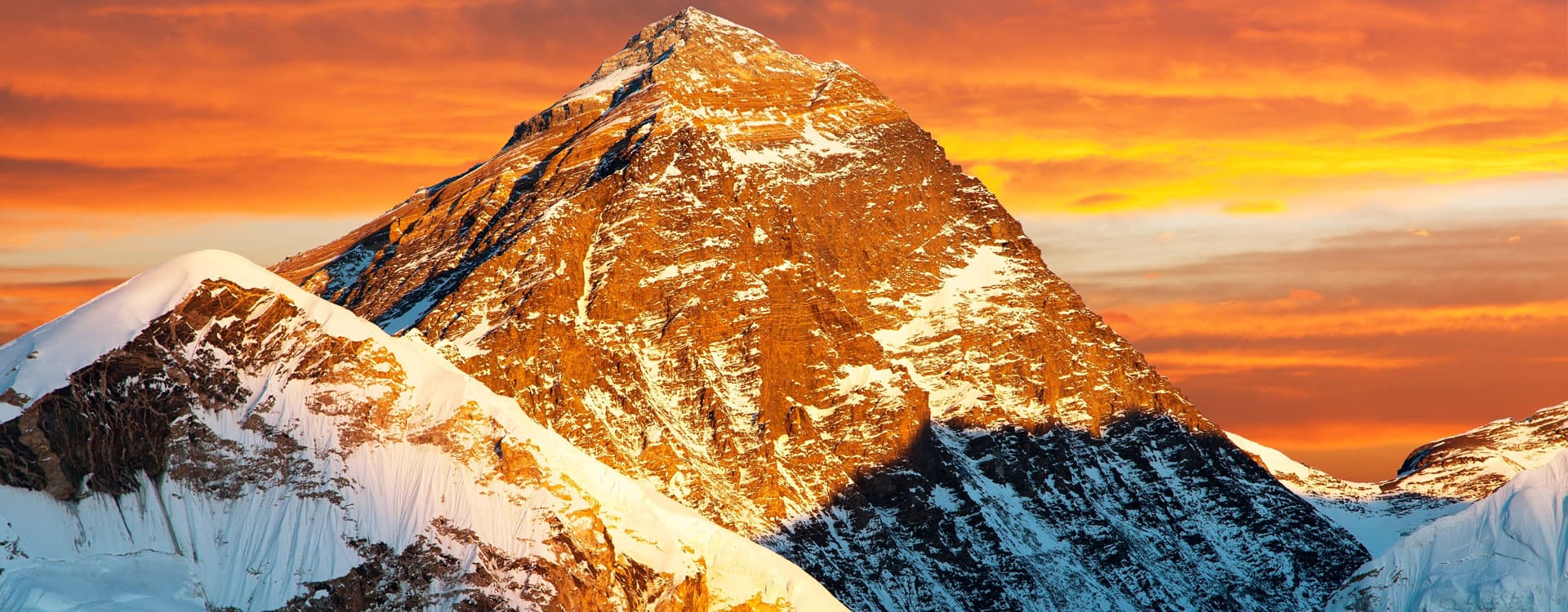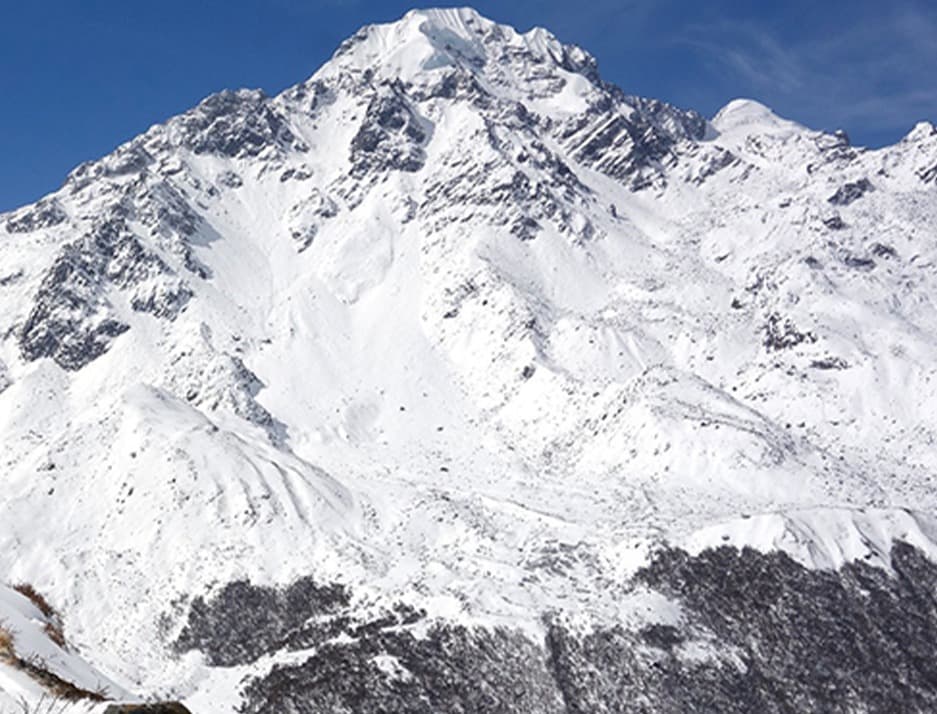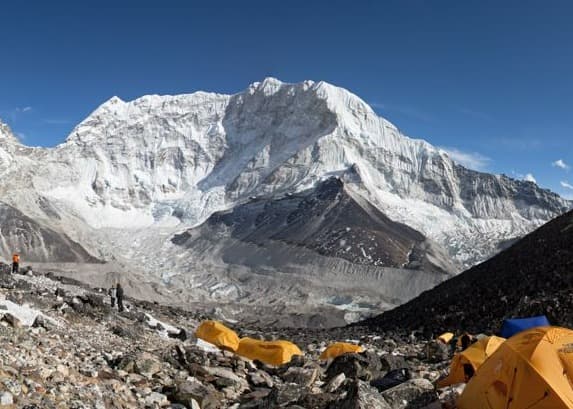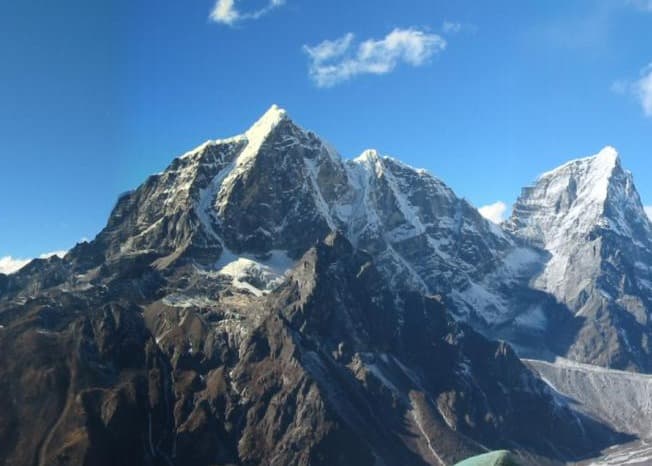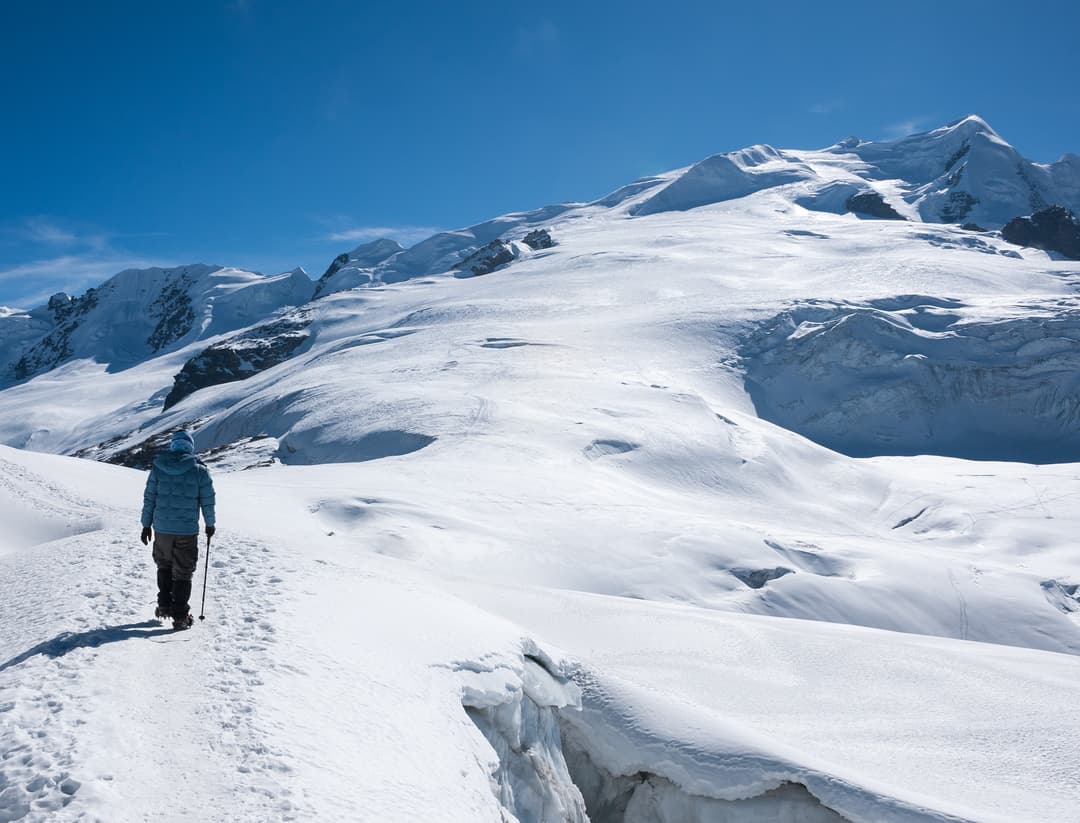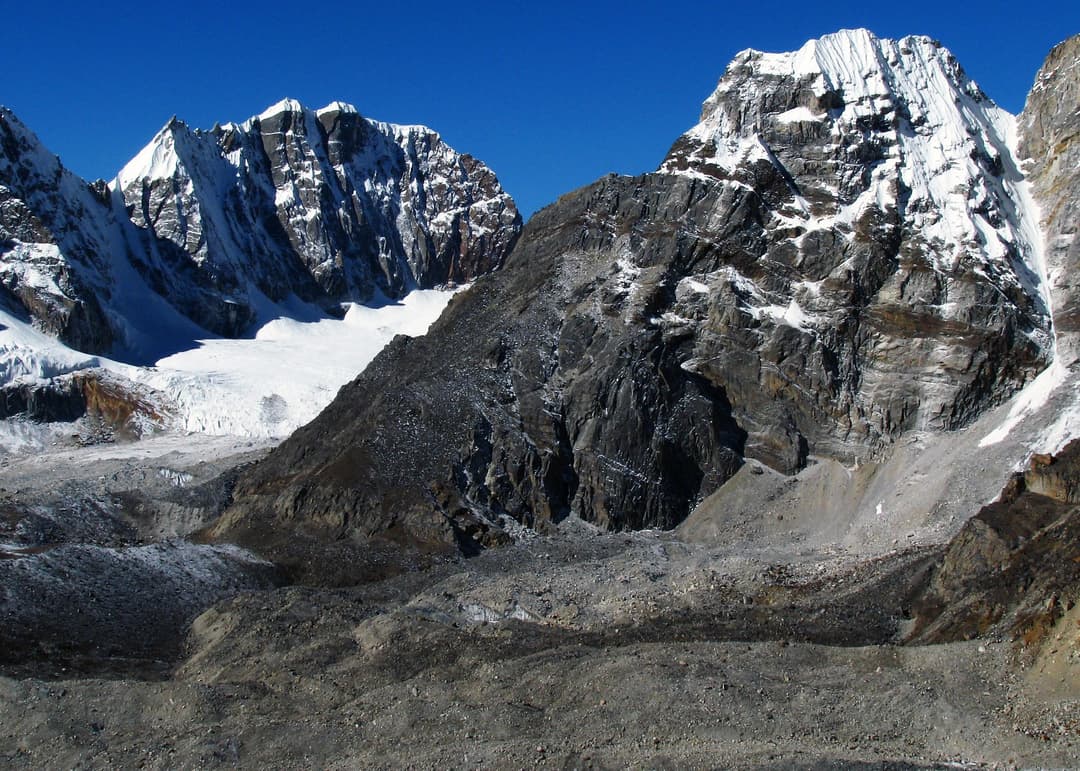1111111
Mt. Everest Expedition 8848.86
What to see & do
About Mt. Everest Expedition 8848.86 - 60 days
At a Glance
Durations
60 days
Trip Difficulty
Strenuous
Activities
Climbing
Accommodation
Camping
Meals
Breakfast/Lunch/Dinner
Mx.altitude
8848m.
Vehicle
Flight/Tourist bus/Private vehicle
Max. People
8
Trip Highlights
Trip Overview
For adventurers, the dream is often encapsulated in a single word: EVEREST. The allure of standing atop the world, touching the sky, and experiencing the grandeur of the Everest Expedition is unparalleled. Mount Everest, the highest peak on Earth at 8,848.86 meters, straddles the border between Nepal and China. Known as Sagarmatha in Nepali, Everest's southern face lies in Nepal, while its northern face is in Tibet.
Historically, Everest was first surveyed by China in 1715 and later by the British Indian government in 1856, who named it Peak XV. It was subsequently renamed in honor of Sir George Everest, a Welsh surveyor-general of India. The fascination with Everest dates back to the 1920s, with numerous expeditions attempting to conquer its summit. The first successful ascent was made by Edmund Hillary and Tenzing Norgay on May 29, 1953, via the southern route.
The Everest Expedition: A Lifetime Opportunity
Attempting the Everest Expedition is a once-in-a-lifetime opportunity. However, climbers must be prepared for extreme challenges, including high altitude, severe weather, and the risk of avalanches. Comprehensive training is essential to build cardiovascular and muscular strength, as oxygen levels drop significantly at higher altitudes. Acclimatization to weather conditions and mastering rescue techniques are also crucial.
Our Everest Expedition begins in early April in Kathmandu, following the southern route to the summit. Preparations include gathering equipment and completing paperwork before flying to Lukla, where the trek to base camp starts, taking approximately seven days. This expedition is ideal for those with experience on peaks above 7,000 meters.
Key points along the route include:
Camp I (6,065m): Views of the Khumbu Glacier.
Camp II (6,750m): A gradual slope from the glacier.
Camp III (7,300m): Located at the head of Lhotse; from here, oxygen cylinders are necessary.
Camp IV (7,910m): Known as the Death Zone, just past 8,000 meters.
Throughout the expedition, our Airbus Heli provides support, delivering fresh food daily and ensuring safety.
Why HLT for Your Everest Expedition?
- Expert Guidance: Our team includes highly qualified, professional, and friendly Sherpa IFMGA guide, kitchen staff, and a basecamp manager.
- Comprehensive Equipment: We provide all necessary climbing equipment and logistic support.
- Safety First: We prioritize safety, taking every step to minimize risks and ensure client well-being.
- Customized Itineraries: We offer various itineraries to suit different abilities and interests.
- Advanced Technology: We use the latest in weather forecasting and communication.
- Helicopter Support: helicopter charter service is available when needed (extra charges apply).
- Dedicated Support: One climbing Sherpa is assigned to each member.
At Himalaya Land Treks, we are committed to providing an exceptional Everest Expedition experience. We eagerly await the opportunity to serve you and share our expertise. Embark on this incredible journey with us and fulfill your dream of conquering the world's highest peak.
Itinerary
Trip day to day detail itinerary
- Day01:
Arrival in Kathmandu (1360m) & Transfer to Hotel
- Day02:
Rest in Kathmandu, Expedition Briefing and Preparation
- Day03:
Fly from Kathmandu to Lukla, and Trek to Phakding (2600m)
- Day04:
Trek from Phakding to Namche Bazaar (3440m)
- Day05:
Acclimatization at Namche Bazaar
- Day06:
Trek from Namche Bazaar to Debuche (3870m)
- Day07:
Trek from Debuche to Dingboche (4243m)
- Day08:
Trek from Dingboche to Lobuche (4930m)
- Day09:
Trek from Lobuche to Everest Base Camp (5364m)
- Day10:
Days 10-39: Rotation (Basecamp – Camp I, Camp II, Camp III – Basecamp)
- Day11:
Days 40-53: Summit Push (Basecamp – Everest Summit – Basecamp)
- Day12:
Day 54: Cleaning Up Base Camp
- Day13:
Day 55: Trek from Base Camp to Pheriche (4371m)
- Day14:
Day 56: Trek from Pheriche to Namche Bazaar
- Day15:
Day 57: Trek from Namche Bazaar to Lukla
- Day16:
Day 58: Fly from Lukla to Kathmandu & Transfer to Hotel
- Day17:
Day 59: Leisure Day in Kathmandu City
- Day18:
Transfer to International Airport for Final Departure
Cost Details
Good to know before trip booking
What's Included
- Arrival and Departure: Airport transfers by private vehicle (pickup and drop-off).
- Hotel Accommodation in Kathmandu: 4 nights at a 5-star hotel in Kathmandu, single room on bed and breakfast plan.
- Welcome Dinner: One welcome dinner at a tourist-standard restaurant in Kathmandu with office staff.
- Cargo Clearance: Assistance with cargo clearance in Nepal’s customs (clearance cost subject to charge).
- Permits:Expedition royalty and permit fee for Mt. Everest.
- Sagarmatha National Park entry permit.
- Pasang Lhamu Rural Municipality entry permit and fee.
- Icefall Fee: Khumbu Icefall climbing charge to Sagarmatha Pollution Control Committee (SPCC).
- Liaison Officer: 1 Government Liaison officer with full equipment, salary, and accommodation.
- Garbage Management: Stool shipment transfer and garbage deposit fees.
- Insurance: Medical and emergency rescue insurance for all Nepalese staff during the trek and expedition.
- Map: Trekking and climbing map.
- Duffle Bag: One Himalaya Land Treks’ duffle bag.
- Domestic flight from Kathmandu to Lukla and return from Lukla to Kathmandu as per itinerary.
- Transportation of all necessary expedition equipment from Kathmandu to Lukla (by air cargo) to Base Camp (by porters/yaks).
- Return from Base Camp to Lukla (by porters/yaks) and Lukla to Kathmandu (by air cargo).
- Possible staff transfer by land (KTM-Phaplu) or helicopter (KTM-Lukla) based on conditions.
- Member Luggage: Up to 70 kg per member for personal baggage during the trek carried by porters or yaks.
- Food and Lodging:3 meals a day (breakfast, lunch, dinner, including tea and coffee) and accommodation at hotel/lodge during the trek and at the Base Camp.
- Regular supply of hygienic fresh vegetables, meat, fruits, soft drinks, and juice via helicopter flights.
- Well-managed base camp setup for members and staff.
- Porter: Porters per member up to the Base Camp and back.
- Base Camp Staff: Experienced and well-trained Base Camp cook and kitchen helpers as required.
- Staff Salary and Allowance: Daily wages, salary, equipment, food, and clothing for all Nepalese staff and porters.
- Base Camp Tent: Individual box tent for each member at Base Camp.
- Base Camp Equipment: Single tent, foam mattress, and pillow per member.
- Dining tent, kitchen tent, communication tent, toilet, shower tent, staff tent, tents for Nepalese base camp staff, storage tents, tables, chairs, and necessary cooking gear.
- Heater: Heater in each dining tent and other necessary camps at Base Camp.
- Solar/Generator/Light: Solar panel and generator for lights, battery charging, laptop, and other electronic devices at Base Camp.
- Medical Checkup: Twice medical checkup of each climber at Base Camp before the summit attempt.
- Bakery and Bar at Base Camp: Bakery and bar services for team members.
Oxygen, mask regulator, ice wall, and ladder training at Base Camp by UIAGM guide. - High Altitude Climbing Sherpa:
- 1 veteran and government-licensed climbing Sherpa per member (1 member: 1 Sherpa) during the entire climb from Base Camp to summit and back, and on each rotation.
- Assistance in carrying gear to high camps by climbing Sherpa.
- Climbing Sherpa Salary and Allowance: Salary, equipment, food, and clothing for climbing Sherpa.
- Bonus: Carry bonus for Sherpas and route fixing charges.
- Oxygen Bottle (O2):
- 5 oxygen bottles (4 liters each) per member and 3 oxygen bottles for each high-altitude Sherpa.
- 1 set of summit oxygen masks and regulators for each member and high-altitude Sherpa.
- Back-up Oxygen: Back-up oxygen cylinder, mask, and regulator (subject to charge).
- High altitude tent, necessary cooking EPI gas, cooking pot, high food for members, Sherpa, and other crew at C1, C2, C3, and C4.
- Group climbing gear, fixed and dynamic ropes during the climbing period as required.
- High Camp Kitchen and Dining:
- Cook, kitchen, and dining tents at Camp I and Camp II.
- Members will share tents in high camps (2 members: 1 tent).
- Rope Fixing Team: Experienced Sherpas fixing the route to the summit (no extra charge for members).
- Satellite Phone: For emergency communication, carried by Sherpa and available for members (subject to charge).
- Walkie-Talkie: For communication from Base Camp to mountain and back.
- Permits: Satellite phone and walkie-talkie permits for all members and staff.
- Internet Service: 1 Mbps internet facility at Base Camp (subject to charge).
- Weather Forecast: Regular weather forecast reports from Meteotest, Bern (Switzerland) during the entire expedition.
- Medical Kit: Comprehensive medical kit for members and staff.
- Certificate: Everest climbing certificate issued by MoCTCA (after successfully climbing Mt. Everest).
What's Not Included
- Air Fare: International flight airfare (to and from Kathmandu).
- Nepal Entry Visa Fee: $125 USD for a 90-day Nepalese visa.
- Extra Nights in Kathmandu: Accommodation costs for extra nights in Kathmandu due to early arrival, late departure, early return from the trek/expedition, or domestic flight cancellations.
- Insurance Policy: Mandatory insurance covering medical and high-altitude evacuation costs, including trip cancellation, interruption, high altitude rescue, air evacuation, medical treatment, and repatriation.
- Personal Expenses: Costs for telephone calls, internet, toiletries, battery recharge, hot showers, laundry, soft drinks, beers, and alcoholic beverages (during the trek and in Kathmandu, although soft drinks are provided at the base camp).
- Personal Climbing Equipment: Costs for clothing, packing items, bags, personal medical kit, and all personal trekking/climbing gear.
- Toiletries: Costs for soaps, shampoos, toilet and tissue papers, toothpaste, and other personal hygiene items.
- Filming: Special filming, camera, and drone permit fees.
- Internet Service: Not included during the trek.
- Summit Bonus: Minimum $2000 USD summit bonus for the climbing Sherpa.
- Tips: Minimum $700 USD for tips to basecamp and high camp staff.
- Extra Services: Any additional services or activities not mentioned in the itinerary or the "Cost Includes" section.
Dates & Prices
Book your trip with confidence
111111111
MAKE AN INQUIRY
Similar Trips
Himalaya Land Treks presents a diverse selection of exhilarating packages.
![[object Object]](/_next/image?url=%2F_next%2Fstatic%2Fmedia%2Flogo.724a9fdb.png&w=640&q=75)
Mt. Everest Expedition 8848.86 - Itinerary
Day01 Arrival in Kathmandu (1360m) & Transfer to Hotel
Arrive at Tribhuvan International Airport in Kathmandu. Meet your expedition team and transfer to your hotel. This day allows you to settle in and rest after your journey.
Day02 Rest in Kathmandu, Expedition Briefing and Preparation
Spend the day resting and acclimatizing to the altitude. Attend an expedition briefing where you will receive important information about the trek and climb. Prepare your gear and make any last-minute purchases.
Day03 Fly from Kathmandu to Lukla, and Trek to Phakding (2600m)
Enjoy an early morning flight from Kathmandu to Lukla (2800m), offering breathtaking views of the Himalayas. From Lukla, trek to Phakding, passing through Sherpa villages and enjoying the natural beauty of the region.
Day04 Trek from Phakding to Namche Bazaar (3440m)
Trek through beautiful pine forests, crossing suspension bridges over the Dudh Koshi River. The trail leads to Namche Bazaar, the bustling market town and gateway to the high Himalayas.
Day05 Acclimatization at Namche Bazaar
Take a rest day for acclimatization. Explore Namche Bazaar, visit local markets, and take short hikes to higher elevations to help your body adjust to the altitude.
Day06 Trek from Namche Bazaar to Debuche (3870m)
Trek through the villages of Tengboche and Pangboche. Enjoy stunning views of Ama Dablam, Everest, and Lhotse as you make your way to Debuche.
Day07 Trek from Debuche to Dingboche (4243m)
Continue trekking to Dingboche, passing through rhododendron forests and taking in panoramic mountain views. Dingboche is a beautiful village with views of the Imja Valley.
Day08 Trek from Dingboche to Lobuche (4930m)
Ascend from Dingboche to Lobuche. The trail passes through the Khumbu Glacier, offering impressive views and a sense of the scale of the landscape.
Day09 Trek from Lobuche to Everest Base Camp (5364m)
Trek from Lobuche to Everest Base Camp, the starting point for your summit expedition. Experience the excitement of reaching Base Camp and prepare for the next stages of your journey.
Day10 Days 10-39: Rotation (Basecamp – Camp I, Camp II, Camp III – Basecamp)
Spend this period acclimatizing and conducting rotation climbs to higher camps. Return to Basecamp after each rotation for rest and recovery. This crucial phase helps your body adapt to the altitude and prepares you for the summit push.
Day11 Days 40-53: Summit Push (Basecamp – Everest Summit – Basecamp)
Undertake the final summit push, ascending from Basecamp to the summit of Mount Everest and returning to Basecamp. This phase requires peak physical and mental endurance and is the culmination of your training and acclimatization.
Day12 Day 54: Cleaning Up Base Camp
Clean up Basecamp, pack your gear, and prepare for the descent. Ensure the area is left in a pristine condition.
Day13 Day 55: Trek from Base Camp to Pheriche (4371m)
Begin the descent from Basecamp to Pheriche. Enjoy the change in scenery and the feeling of accomplishment as you descend.
Day14 Day 56: Trek from Pheriche to Namche Bazaar
Continue descending from Pheriche to Namche Bazaar. Revisit familiar places and enjoy the lower altitude.
Day15 Day 57: Trek from Namche Bazaar to Lukla
Final day of trekking from Namche Bazaar to Lukla. Celebrate the completion of your trek with your team.
Day16 Day 58: Fly from Lukla to Kathmandu & Transfer to Hotel
Take an early morning flight from Lukla to Kathmandu. Transfer to your hotel for a well-deserved rest and enjoy the comforts of the city.
Day17 Day 59: Leisure Day in Kathmandu City
Spend the day exploring Kathmandu, shopping for souvenirs, or simply relaxing. Reflect on your incredible journey and achievements.
Day18 Transfer to International Airport for Final Departure
Transfer to Tribhuvan International Airport for your departure flight. Bid farewell to Nepal and your expedition team, taking home unforgettable memories and a sense of accomplishment.
What's Included
- Arrival and Departure: Airport transfers by private vehicle (pickup and drop-off).
- Hotel Accommodation in Kathmandu: 4 nights at a 5-star hotel in Kathmandu, single room on bed and breakfast plan.
- Welcome Dinner: One welcome dinner at a tourist-standard restaurant in Kathmandu with office staff.
- Cargo Clearance: Assistance with cargo clearance in Nepal’s customs (clearance cost subject to charge).
- Permits:Expedition royalty and permit fee for Mt. Everest.
- Sagarmatha National Park entry permit.
- Pasang Lhamu Rural Municipality entry permit and fee.
- Icefall Fee: Khumbu Icefall climbing charge to Sagarmatha Pollution Control Committee (SPCC).
- Liaison Officer: 1 Government Liaison officer with full equipment, salary, and accommodation.
- Garbage Management: Stool shipment transfer and garbage deposit fees.
- Insurance: Medical and emergency rescue insurance for all Nepalese staff during the trek and expedition.
- Map: Trekking and climbing map.
- Duffle Bag: One Himalaya Land Treks’ duffle bag.
- Domestic flight from Kathmandu to Lukla and return from Lukla to Kathmandu as per itinerary.
- Transportation of all necessary expedition equipment from Kathmandu to Lukla (by air cargo) to Base Camp (by porters/yaks).
- Return from Base Camp to Lukla (by porters/yaks) and Lukla to Kathmandu (by air cargo).
- Possible staff transfer by land (KTM-Phaplu) or helicopter (KTM-Lukla) based on conditions.
- Member Luggage: Up to 70 kg per member for personal baggage during the trek carried by porters or yaks.
- Food and Lodging:3 meals a day (breakfast, lunch, dinner, including tea and coffee) and accommodation at hotel/lodge during the trek and at the Base Camp.
- Regular supply of hygienic fresh vegetables, meat, fruits, soft drinks, and juice via helicopter flights.
- Well-managed base camp setup for members and staff.
- Porter: Porters per member up to the Base Camp and back.
- Base Camp Staff: Experienced and well-trained Base Camp cook and kitchen helpers as required.
- Staff Salary and Allowance: Daily wages, salary, equipment, food, and clothing for all Nepalese staff and porters.
- Base Camp Tent: Individual box tent for each member at Base Camp.
- Base Camp Equipment: Single tent, foam mattress, and pillow per member.
- Dining tent, kitchen tent, communication tent, toilet, shower tent, staff tent, tents for Nepalese base camp staff, storage tents, tables, chairs, and necessary cooking gear.
- Heater: Heater in each dining tent and other necessary camps at Base Camp.
- Solar/Generator/Light: Solar panel and generator for lights, battery charging, laptop, and other electronic devices at Base Camp.
- Medical Checkup: Twice medical checkup of each climber at Base Camp before the summit attempt.
- Bakery and Bar at Base Camp: Bakery and bar services for team members.
Oxygen, mask regulator, ice wall, and ladder training at Base Camp by UIAGM guide. - High Altitude Climbing Sherpa:
- 1 veteran and government-licensed climbing Sherpa per member (1 member: 1 Sherpa) during the entire climb from Base Camp to summit and back, and on each rotation.
- Assistance in carrying gear to high camps by climbing Sherpa.
- Climbing Sherpa Salary and Allowance: Salary, equipment, food, and clothing for climbing Sherpa.
- Bonus: Carry bonus for Sherpas and route fixing charges.
- Oxygen Bottle (O2):
- 5 oxygen bottles (4 liters each) per member and 3 oxygen bottles for each high-altitude Sherpa.
- 1 set of summit oxygen masks and regulators for each member and high-altitude Sherpa.
- Back-up Oxygen: Back-up oxygen cylinder, mask, and regulator (subject to charge).
- High altitude tent, necessary cooking EPI gas, cooking pot, high food for members, Sherpa, and other crew at C1, C2, C3, and C4.
- Group climbing gear, fixed and dynamic ropes during the climbing period as required.
- High Camp Kitchen and Dining:
- Cook, kitchen, and dining tents at Camp I and Camp II.
- Members will share tents in high camps (2 members: 1 tent).
- Rope Fixing Team: Experienced Sherpas fixing the route to the summit (no extra charge for members).
- Satellite Phone: For emergency communication, carried by Sherpa and available for members (subject to charge).
- Walkie-Talkie: For communication from Base Camp to mountain and back.
- Permits: Satellite phone and walkie-talkie permits for all members and staff.
- Internet Service: 1 Mbps internet facility at Base Camp (subject to charge).
- Weather Forecast: Regular weather forecast reports from Meteotest, Bern (Switzerland) during the entire expedition.
- Medical Kit: Comprehensive medical kit for members and staff.
- Certificate: Everest climbing certificate issued by MoCTCA (after successfully climbing Mt. Everest).
What's not Included
- Air Fare: International flight airfare (to and from Kathmandu).
- Nepal Entry Visa Fee: $125 USD for a 90-day Nepalese visa.
- Extra Nights in Kathmandu: Accommodation costs for extra nights in Kathmandu due to early arrival, late departure, early return from the trek/expedition, or domestic flight cancellations.
- Insurance Policy: Mandatory insurance covering medical and high-altitude evacuation costs, including trip cancellation, interruption, high altitude rescue, air evacuation, medical treatment, and repatriation.
- Personal Expenses: Costs for telephone calls, internet, toiletries, battery recharge, hot showers, laundry, soft drinks, beers, and alcoholic beverages (during the trek and in Kathmandu, although soft drinks are provided at the base camp).
- Personal Climbing Equipment: Costs for clothing, packing items, bags, personal medical kit, and all personal trekking/climbing gear.
- Toiletries: Costs for soaps, shampoos, toilet and tissue papers, toothpaste, and other personal hygiene items.
- Filming: Special filming, camera, and drone permit fees.
- Internet Service: Not included during the trek.
- Summit Bonus: Minimum $2000 USD summit bonus for the climbing Sherpa.
- Tips: Minimum $700 USD for tips to basecamp and high camp staff.
- Extra Services: Any additional services or activities not mentioned in the itinerary or the "Cost Includes" section.
